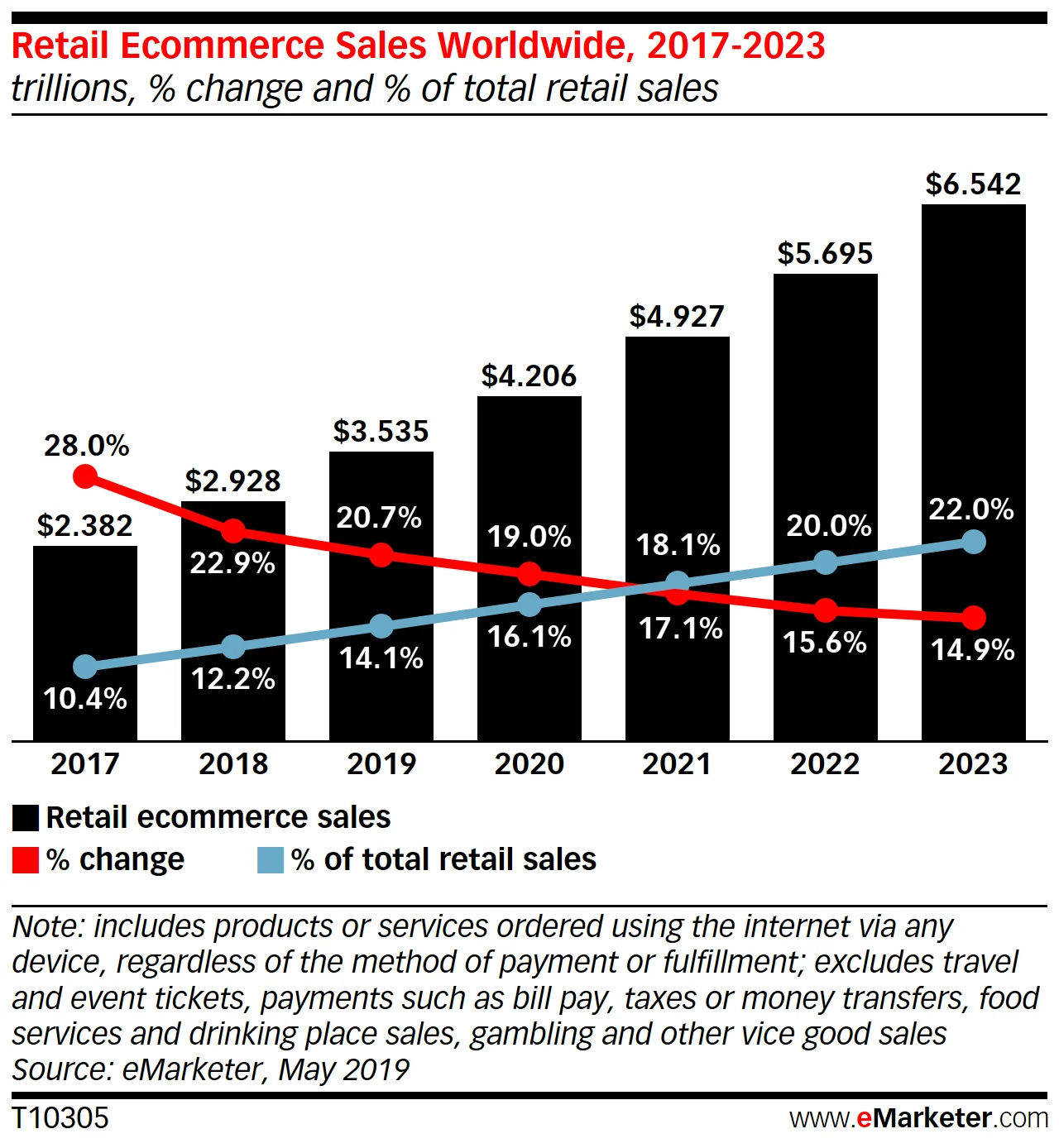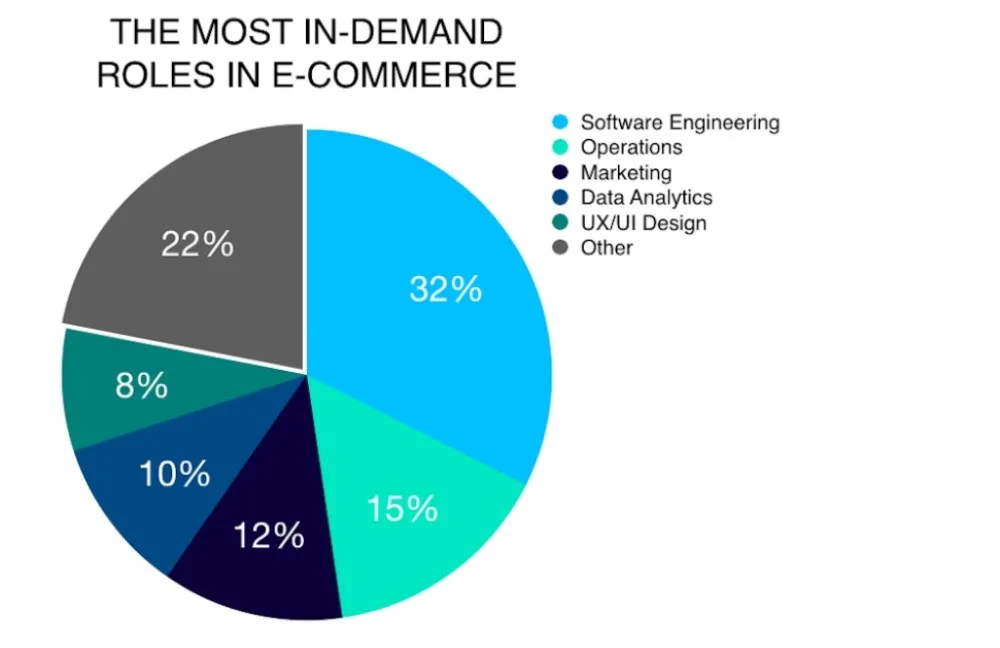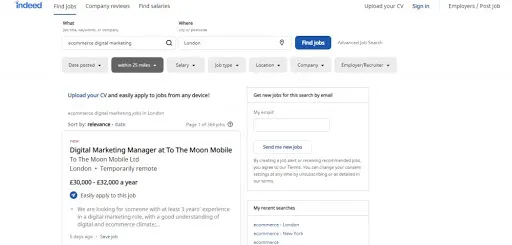Jobs in Ecommerce: Everything you Need to Know to Enhance Your Career in a Booming Industry

The global ecommerce industry is vast. In 2019, the value of ecommerce sales worldwide reached $3.535 trillion. Yes, trillion…with a ‘T’. The size of the sector has been growing year-on-year for over a decade.

It’s fair to say that online shopping has revolutionized retail. As ecommerce first took hold, pessimistic prognosticators claimed it would be a death knell for retail jobs. The age of shop assistants, they argued, was over.
That may have proved right to an extent, but the idea that ecommerce would harm the job market isn’t. You don’t need an in-person shop assistant for each purchase, but you do need 1000s of workers behind the scenes. They’re who make online shopping work.
If you’re looking to join their ranks, you’ve come to the right place. In this post, we’ll tell you all you need to know about jobs in ecommerce. That includes:
Why jobs in ecommerce are so sought after
Which are the hottest ecommerce jobs around
Where you can find the right ecommerce job for you
Which skills you should hone to improve your chances of landing that ideal role
Why Look for an Ecommerce Job Right Now?
Ecommerce is big business. Ask someone to name the most significant company they can think of, and many of them will come back with ‘Amazon’. As such a thriving sector, there are many reasons to seek either full-time or part-time jobs with ecommerce companies.
1. Ecommerce has a fantastic long-term global growth outlook.
As we saw earlier, the ecommerce market has seen sustained growth for years. At a time when many sectors are struggling, the industry’s future prospects also look brighter.
During the COVID-19 pandemic, many people have shopped online more rather than less – at least for many types of products. It’s been one of the biggest changes alongside the growth in remote working. Plenty of people have had greater exposure to ecommerce during lockdowns. That’s likely to impact shopping habits well beyond the end of the crisis.
2. Ecommerce gives you a “feel” for customers.
Modern ecommerce businesses are obsessed with giving superior user experience. To succeed in the competitive niche, an ecommerce company must be customer-centric. That means teaching their staff to empathize with and understand consumers. It’s as essential as providing tools such as a VoIP phone system for small businesses to aid communication.
A job in ecommerce, then, is a great way to get a ‘feel’ for customers. You’ll learn how to ID pain points and understand how to serve consumers best. Those are transferable skills that will stand you in good stead in your career.
3. Ecommerce exposes you to all aspects of a business.
Ecommerce jobs are, by nature, multi-faceted. When you work for an ecommerce business, you’ll get presented with varied tasks. It’s how the sector operates. Workforce optimization in the niche usually means using the same staff for many activities.
One day you may need to monitor the brand’s social media, the next, you could be editing their ecommerce platform. The wide-ranging experience you’ll gain will stand you in good stead for the future.
4. Learn fast by instant feedback.
Online shoppers expect a seamless customer experience. Part of that is expecting ecommerce companies to react at speed to criticism or issues. The need for speed trickles down to all ecommerce staff, even those in entry level positions.
Working in such a high-pace environment presents lots of learning opportunities. You’ll get instant feedback on your efforts and be expected to respond. If you can handle the pressure, your hard and soft skills will improve in no time.
19 Hottest Jobs in Ecommerce
As the ecommerce sector grows, so do the job opportunities within it. Far more than you may realize goes into making your online order go smoothly. The following are just 17 examples of the types of ecommerce jobs out there waiting for you to grab them.
1. Entry-level jobs in ecommerce.
As with many industries, new hires in ecommerce may have to start with an entry level job and work their way up. Unlike other sectors, though, you’ll find plenty of these types of job postings from ecommerce businesses.
Internships
Internships are a great way to get a foot in the door of any organization. An ecommerce business is no exception. The beauty of being an intern is that you can prove your utility to a company without much prior experience.
It’s likely only to be the largest firms that take on interns. Such positions can be paid, stipend, or unpaid. The first and last of those options are self-explanatory. A stipendiary internship is one where your travel or other expenses may get covered. You don’t, though, receive a wage or salary.
As an intern, you’re expected to turn your hand to whatever an ecommerce manager asks. You won’t be doing anything glamorous like developing new products. You may end up making lots of coffee. No matter, you’ll gather loads of invaluable experience.
Customer service representative
Of all ecommerce job titles, customer service representative is the most fundamental. No ecommerce company can thrive without these employees. They’re the frontline workers who handle orders and answer customer queries. Often, they may also deal with inbound sales over the phone.
In smaller firms, these individuals may also dabble in other areas at quieter times. That means things like email marketing, ecommerce website design, and more. At time of writing, the US national average wage for a customer service representative is $16 per hour.
Marketing specialist
Marketing is an essential part of ecommerce. Marketing specialists help businesses track and understand prevailing market trends. They ensure that new products, promotions, and more get tailored to consumer demands.
Larger ecommerce companies may have a marketing manager above a team of specialists. At an SME, a customer service rep or another team member may be asked to be a marketing specialist, too.
SEO content writer
In the online world, the search engine is king. No ecommerce business can thrive if their pages don’t get plenty of traffic. An SEO content writer is essential to vaulting a site up the search engine results pages.
These workers are responsible for optimizing all the written content on ecommerce websites. They use platforms like Google Analytics to track and improve the performance of product, category, and other pages. They’re likely also to be involved with link building.
Once again, the role of SEO content writer may fall to another worker at the smallest ecommerce businesses. Major brands, meanwhile, might have a full team of writers. They may even outsource the work to specialists.
Warehouse personnel
Logistics is a critical aspect of ecommerce. You can have all the SEO or digital marketing in the world, but your firm will fail if you can’t fulfill orders. Warehouse personnel are essential to order fulfillment.
They pick the items needed for each order, pack them, and ensure they leave on time. Workers in the warehouse are also vital for inventory management. They update colleagues or systems on stock levels, ensuring firms don’t over or undersell. All ecommerce firms – except those who only dropship – will have warehouse personnel.
If you are looking to hire roles across the supply chain, logistics, fulfillment, and warehousing, check out the Ecommerce Ops job board for the top candidates.
Administrative assistant
Operating an ecommerce business generates a lot of admin. That includes handling supplier payments, doing the accounts, and more. An administrative assistant shoulders the burden of such paperwork and organization.
An admin assistant’s role may form part of a customer service rep’s job in a smaller firm. That’s even though their job title does not cover it. More notable brands, meanwhile, will have specialists who are not customer-facing.
Retention specialist
This is one of the broader job descriptions in the world of ecommerce. A retention specialist works to keep customers loyal to a brand, in whatever way they can. Maintaining a customer base, after all, is critical to any business.
These employees can be either full-time or part-time. They are usually restricted, though, to more established brands. They’re not strictly ecommerce specialists and can work in other fields, too. Their job is to ensure customer experiences that keep shoppers coming back for more. They might create ebooks of product usage instructions or reach out to customers for feedback.
2. Experienced-level jobs in ecommerce.
That accounts for the entry level jobs in ecommerce. One of the great things about the sector, though, is that there are also plenty of opportunities for more experienced candidates.
User experience designer
User experiences are fundamental to ecommerce. They’re the interactions between customers and a brand’s services – i.e., their website or apps. A user experience (UX) designer must ensure those services work as well as they can.
A UX designer would have been responsible for tailoring the site to its audience. They will have decided on the placement of the search bar, and the titles for the navigation tabs.
That’s only scratching the surface. These professionals must understand online marketing, customer experience, and more. That’s the only way to get UX design just right. They may even play a part in optimizing tools like ACD call center software to aid customer support.
Community builder
All businesses – in ecommerce and otherwise – want loyal customers. Consumers who keep coming back for more are great for the bottom line. One way to boost loyalty is by building a community around your ecommerce brand. This is something that often leverages the power of social media.
We can all think of those brands whose customers are more like fanatics. They’re always talking about the latest new product or what else a firm is up to. They’re hugely useful as brand advocates. A community builder aims to create such a following by combining the roles of a social media specialist and project manager.
Developer
There are two main types of developers who work for ecommerce businesses. Those are website and software developers. The role of the former is self-explanatory. The latter are often tasked with building specialist databases or applications.

These roles are amongst the most sought after. Recruiting top tech talent, after all, is always tricky. Less established ecommerce businesses may not have such professionals in-house. They’re more likely to use ready-made ecommerce platforms or outsource development work. The biggest brands – who can afford the higher wages – are where these roles exist.
IT Technician
Ecommerce companies have extensive IT infrastructures. Many run various types of software solutions and have lots of hardware in offices and warehouses. An IT technician is charged with providing the all-important technical support. The more complex the infrastructure, the more crucial that technical support gets.
Business analyst
This is another job title that’s unlikely to get found at smaller companies. The big boys of ecommerce, though, certainly have in-house business analysts. Their job is to keep their fingers on the pulse of business operations.
A business analyst will analyze the data generated by an ecommerce company. They’ll then report back to ecommerce managers, project managers, and others about what is and isn’t working.
Graphic designer
Ecommerce is a visual niche. The imagery used on an ecommerce website or in marketing materials plays a major role in influencing customers. Online consumers, after all, can’t see products ‘in the flesh’.
A graphic designer for an ecommerce business handles that crucial visual communication. They may get charged with designing a new homepage or drafting images for new products. A more significant firm with lots of need for original content would employ several in-house graphic designers.
3. Management jobs in ecommerce.
There is also a range of managerial positions within the ecommerce niche. It’s little wonder, with so many different professionals for each firm to keep track of. These are some of the most common management jobs in ecommerce.
Supply chain manager
Keeping track of the supply chain is essential for any ecommerce brand to succeed. A supply chain manager has ultimate responsibility for that process. That means they must stay across many activities and areas. Those include relationships with suppliers, inventory management, deliveries, and reverse logistics. Amongst other elements.
A supply chain manager is in charge of their company’s warehouse personnel. In ecommerce businesses with tight budgets, an owner may take up this role by proxy. Many companies, though, will employ a dedicated supply chain manager.
Digital operations manager
A digital operations manager is similar to a project manager. In their case, though, the project encompasses all the firm’s digital activities. Think website maintenance, SEO, email marketing, and more. In essence, this ecommerce specialist must keep all digital platforms operational and stable.
Digital marketing manager
There’s a fair bit of crossover in the roles of digital operations and digital marketing managers. This job title, however, is more specialized. This type of ecommerce manager focuses on material that’s customer-facing.
A digital marketing manager is in charge of all online promotion of a brand. They use tools such as Google Analytics and manage staff, including SEO content writers and community builders.
Customer satisfaction manager
We’ve already touched on the importance of world class customer service in ecommerce. Dissatisfied customers swiftly abandon online brands. Some larger ecommerce companies, then, employ a dedicated customer satisfaction manager.
This individual must keep an overview of all the brand’s attempts to improve user experience. They would have responsibility for non-managerial customer service employees. They also play a part in tech decisions impacting those staff. For instance, they might recommend a call forwarding service to connect customers better to support agents.
Financial manager
In ecommerce, as elsewhere in business, managing the money is vital. A financial manager has ultimate control over a firm’s finances. That means they look after budgets, expenditure, payroll, and more.
The role of a financial manager is crucial to all ecommerce businesses. For those with limited budgets, though, their tasks may fall to other managers. Multi-tasking is a hallmark of SMEs, after all.
Director of ecommerce
The big cheese. The head honcho. The…well, you get the idea. The director of ecommerce is in charge of all a firm’s online shopping operations. The previous managers and all other ecommerce project managers answer to them. For the most significant decisions, this is where the buck stops.
Skills Necessary for a Successful Ecommerce Career
Now you’ve read our rundown of the hottest jobs in ecommerce, you may have found the one you want. What’s left is to do everything you can to go out and get it. That starts with honing the essential skills you’ll need in your new job.
1. Technical skills.
Here are the technical skills you may need for a great job in ecommerce.
Ecommerce SEO
Web traffic is like gold dust to any ecommerce brand. Getting more people to visit their site is one crucial way of growing revenue. Ecommerce SEO is fundamental to increasing traffic. You stand a much better chance of getting employed, then, if you’re an expert. Try to learn about things like keyword research, metadata, and link building.
Excellent writer
Much of succeeding in ecommerce is about being persuasive. An ecommerce website must convince visitors to buy. So must any online marketing materials. The copy used on product pages and elsewhere, then, must be top-notch. If you’re able to write such content, a potential employer will sit up and take notice.
Analyze data
Ecommerce businesses generate lots of data. Information comes from diverse sources like Google Analytics and order management software. That info can build up quickly and is invaluable if interpreted correctly. Teach yourself to analyze data and recognize patterns. That way, you can help a new employer track consumer trends and perform more accurate demand forecasting.
Understand the market
No ecommerce brand exists in a vacuum. Each one gets affected by market trends and the actions of their rivals. It’s crucial for team members at each brand, then, to understand the broader market. Educate yourself on this before you start a new job, and you’ll have a head start.
2. Soft skills.
These soft skills will help advance any ecommerce career.
Creativity
Getting new jobs in ecommerce isn’t all about practical skills. The top companies will take it as read that applicants can use Excel or understand product management. They want candidates who support those abilities with soft skills like creativity.
Adaptability
You should have realized by now that working in ecommerce is fast-paced and unpredictable. Whether you work in a customer-facing or backroom role, no two days are the same. Being able to adapt to what each shift throws at you is essential, therefore.
People skills
You might think that there’s less human interaction in ecommerce than traditional retail. In sheer numbers, you could be right. The interactions there are, though, are more critical and trickier to navigate. It’s not as easy to ease an unhappy customer’s concerns via email as it is in person. Nor is it as straightforward to sell the benefits of a product that someone can’t see or touch. People skills, then, are crucial to ecommerce roles.
I’m Ready to Work in Ecommerce. Where Should I Look?
Identified the ecommerce job you want? Sharpened up your practical and human skills? Then you’re ready to get out there and capture your dream role. Here are some tips to help you on your way.
1. Get a referral.
We’ve all heard the adage that ‘it’s not what you know, it’s who you know’. You can’t show off your skills, after all, until a manager or recruiter agrees to meet you. Getting a referral from an existing employee is an excellent way to get your foot in the door.
Employers like hiring candidates recommended to them by trusted colleagues. It’s quicker than traditional recruiting, and the applicant has already been vouched for. Reaching out to contacts who already work in ecommerce is a superb first step to getting new jobs in the sector.
2. Expand your network.
You might be unfortunate and not know anyone working at a company you want to join. This is more likely for those looking to get an entry level job. It’s not the quickest or most straightforward tip, but it pays to grow your network.
That means making new connections who could help you with referrals down the road. There are plenty of ways to do this, including:
Volunteering
Attending ecommerce conferences and events
Joining professional groups on LinkedIn, Facebook, etc.
Enjoying hobbies and interests that introduce you to different groups of people
3. Create an ecommerce presence.
If you’re looking for a higher-level new job, a prospective employer expects a level of expertise. They’ll want to see proof you’re an authority in your field. You need to present them with evidence of precisely that.
This is another long-term strategy. You must build your ecommerce presence throughout your career. Try things like writing educational blogs or speaking at conferences. Maybe you could even sign up to Help a Reporter Out as an expert source on all things ecommerce.
4. Work with a recruiter.
Finding the perfect new job is a personal endeavor. That doesn’t mean you can’t get help, though. Recruiters are there to do all they can to get you that dream role. They can guide you through the whole process. That includes getting you access to positions that may not get publicly advertised. Some ecommerce companies, after all, work exclusively with recruiters to fill their vacancies.
5. Explore a job board.
When new jobs get advertised, they appear on job boards. These are online forums you can sift in search of the perfect opening for you. The following are four useful platforms to get you started.
Indeed
Indeed is a job board with a global presence. It’s designed to make it straightforward to find whichever new career you desire.

You can upload your resume to make it searchable by recruiters. What’s more, the intuitive search feature lets you find specific roles where you live.
We’ve all heard of LinkedIn. It’s the more professional, big brother of the usual social media channels. You might have used it for networking remotely, or even a bit of marketing if that’s your field.
You can also utilize the platform as a job board. Simply head to the ‘Jobs’ tab of the network, and get started. A prominent search feature makes it straightforward to find those ideal positions. You can also set up job alerts to ensure you don’t miss any new opportunities that get posted.
ZipRecruiter
ZipRecruiter is another readily available board for job seekers to search. Headquartered in California, the company’s reach is worldwide. The job board often boasts over one million opportunities.
Once again, the easiest way to use ZipRecruiter is by performing a swift search. You can also, however, set up a profile and use a range of extra features. They include being able to browse ‘Suggested Jobs’ and create job alerts.
Ecommerce job board
As its name suggests, our final job board is one specifically for the ecommerce sector. Ecommerce job boards are devoted to advertising full-time, part-time, and freelance roles in the industry.
The principal benefit of this board is that more of the advertised jobs will apply to you. You don’t have to filter out all those opportunities in different sectors. Instead, you can browse only roles related to your area of interest.
Conclusion
Ecommerce is a booming sector. Sales and revenue in the market have grown year-on-year for over a decade. Even amid the uncertainty of COVID-19, online shopping is a robust industry. That makes it an excellent one in which to launch a career.
Whether you’re starting out or have experience, there are loads of hot jobs in ecommerce. Hopefully, thanks to our rundown of those opportunities, you know the role that will suit you. What’s left for you to do, then, is place yourself best to grab that dream job.
Build your technical and soft skills to make yourself an irresistible candidate. Then, trawl your network, recruiters, and job boards to pinpoint the opportunity you’re going to turn into a new job. With your new grounding in jobs in ecommerce, you can’t fail.

Sam O'Brien is the Director of Digital and Growth for EMEA at RingCentral, a global UCaaS systems provider. Sam has a passion for innovation and loves exploring ways to collaborate more with dispersed teams.


